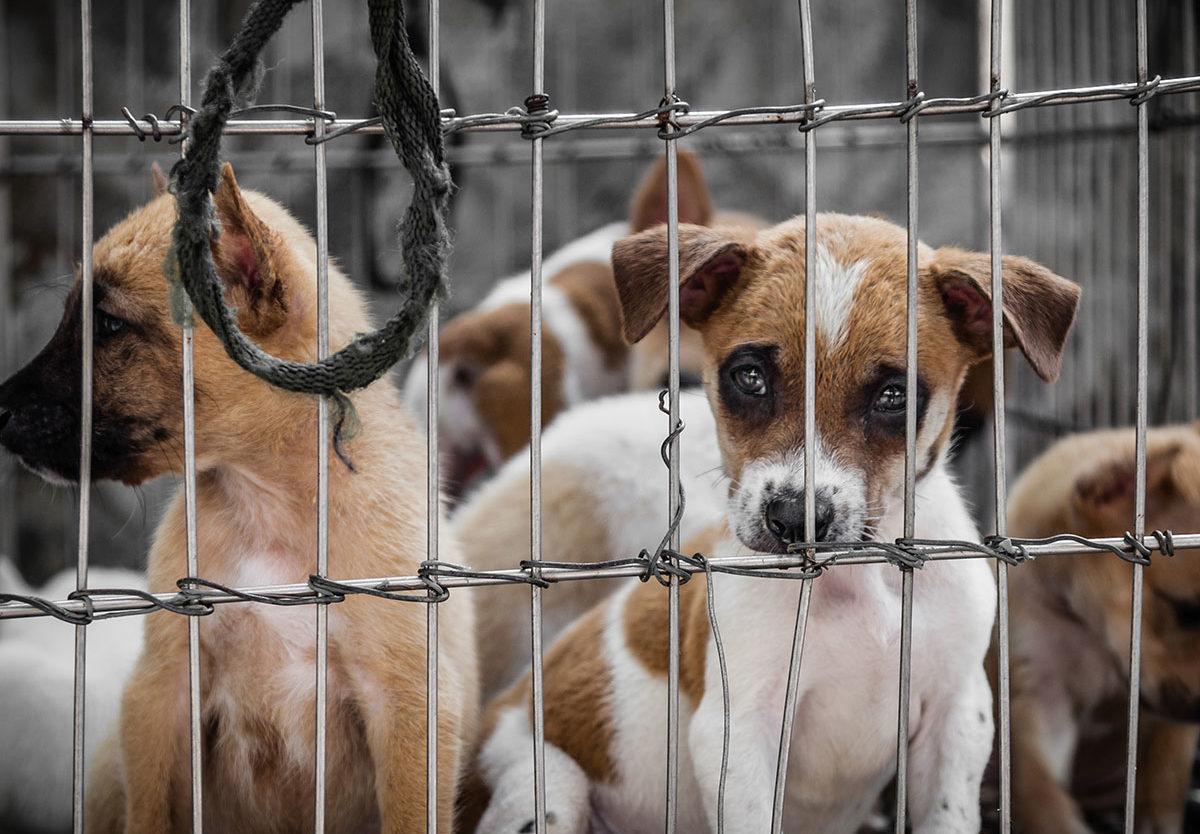
Animal cruelty is a distressing reality that continues to plague our society, causing immense suffering to innocent creatures. As we delve into the world of animals and their interactions with humans, it becomes evident that the issue of animal cruelty is multifaceted and deeply concerning. From domestic pets to wildlife, animals across the globe face various forms of abuse and mistreatment, highlighting the urgent need for awareness and action.
In this article, we will explore 12 compelling facts about animal cruelty, shedding light on the harsh realities faced by our fellow inhabitants of this planet. By uncovering these facts, we aim to raise awareness, ignite empathy, and encourage positive change. Join us on this insightful journey as we delve into the depths of animal cruelty, learning about its impact and what we can do to make a difference. Let's embark on this exploration with an open heart and a determination to advocate for the well-being of all creatures, great and small.
Key Takeaways:
- Animal cruelty affects a wide range of animals, from pets to wildlife, and requires collective action to prevent and address it, promoting a more compassionate world for all living beings.
- Advocacy and empathy are crucial in combating animal cruelty, inspiring individuals and communities to protect animals and create environments where they are valued, respected, and free from harm.
Animal cruelty is a global issue
Animal cruelty is a global issue that encompasses a wide range of behaviors harmful to animals, from neglect to malicious killing. This widespread problem affects animals in various settings, including homes, farms, entertainment venues, and the wild. The severity of animal cruelty can range from unintentional neglect to deliberate harm, causing immense suffering to innocent creatures. Understanding the prevalence and impact of animal cruelty is crucial in addressing this pressing concern and promoting compassion and respect for all living beings.
Animal cruelty can take many forms
Animal cruelty can take many forms, including physical abuse, neglect, abandonment, and exploitation for entertainment or profit. Physical abuse involves inflicting pain or injury on animals, while neglect encompasses depriving animals of basic necessities such as food, water, shelter, and medical care. Abandonment leaves animals vulnerable and without essential resources for survival. Furthermore, animals are often exploited for entertainment purposes, such as in circuses, where they endure unnatural living conditions and mistreatment for human amusement.
Animal cruelty affects diverse species
Animal cruelty affects diverse species, including domestic pets, farm animals, wildlife, and marine life. Domestic pets, such as dogs and cats, are often subjected to neglect and abuse in homes or breeding facilities. Farm animals endure harsh conditions in industrial agriculture, facing confinement, overcrowding, and inhumane slaughter practices. Wildlife and marine life are threatened by habitat destruction, poaching, and illegal trade, leading to population declines and species endangerment. The far-reaching impact of animal cruelty underscores the urgent need for comprehensive protection and advocacy for all animals.
Animal cruelty has legal implications
Animal cruelty has legal implications and is addressed through animal welfare laws and regulations. Many countries have legislation that defines and prohibits various forms of animal cruelty, establishing standards for animal care and protection. These laws aim to prevent and punish acts of cruelty, safeguarding the well-being of animals and holding perpetrators accountable for their actions. However, enforcement and compliance with animal welfare laws remain significant challenges, requiring ongoing efforts to strengthen legal protections and ensure the ethical treatment of animals across different environments.
Animal cruelty reflects societal attitudes
Animal cruelty reflects societal attitudes towards animals and underscores the importance of promoting empathy and responsible stewardship. Cultural norms and beliefs influence the treatment of animals, shaping perceptions of their value and rights. By fostering a culture of compassion and ethical responsibility, communities can work towards preventing and addressing animal cruelty. Education, advocacy, and ethical awareness play pivotal roles in shaping positive attitudes and behaviors towards animals, nurturing a more humane and harmonious coexistence between humans and the animal kingdom.
Animal cruelty impacts human well-being
Animal cruelty impacts human well-being, as the welfare of animals is intricately linked to the overall health of ecosystems and communities. The mistreatment of animals can have detrimental effects on environmental sustainability, public health, and social dynamics. Furthermore, research has shown that individuals who engage in animal cruelty may demonstrate violent tendencies towards humans, highlighting the interconnectedness of animal welfare and human welfare. By prioritizing the protection and welfare of animals, society can contribute to fostering a safer, more compassionate world for all living beings.
Animal cruelty necessitates collective action
Animal cruelty necessitates collective action and collaboration across individuals, organizations, and governments to address root causes and implement effective solutions. By raising awareness, supporting animal welfare initiatives, and advocating for policy changes, people can contribute to the prevention and reduction of animal cruelty. Additionally, promoting ethical consumer choices and supporting cruelty-free practices in industries can drive positive change and encourage responsible treatment of animals. Through unified efforts, society can work towards creating a more compassionate and sustainable future for animals worldwide.
Animal cruelty requires ongoing vigilance
Animal cruelty requires ongoing vigilance and proactive measures to safeguard the well-being of animals and prevent instances of abuse and neglect. By staying informed, reporting suspected cases of animal cruelty, and supporting rescue and rehabilitation efforts, individuals can play a vital role in protecting animals from harm. Furthermore, fostering empathy and respect towards animals within communities and educational institutions can instill values of kindness and empathy, nurturing a culture of compassion and advocacy for animal welfare.
Animal cruelty demands ethical accountability
Animal cruelty demands ethical accountability and responsible decision-making in all aspects of human-animal interactions. Whether in the context of pet ownership, agricultural practices, wildlife conservation, or entertainment industries, ethical considerations should guide actions and policies to ensure the dignified treatment of animals. By prioritizing ethical accountability and advocating for the rights of animals, individuals and societies can contribute to creating environments where animals are valued, respected, and protected from cruelty.
Animal cruelty inspires compassion and advocacy
Animal cruelty inspires compassion and advocacy, prompting individuals and organizations to champion the rights and well-being of animals. Through volunteer work, donations to animal welfare causes, and participation in advocacy campaigns, people can make meaningful contributions to combating animal cruelty and promoting humane treatment. By amplifying the voices of animals and working towards systemic change, advocates can strive to create a world where animals are cherished as sentient beings deserving of care, compassion, and dignity.
Animal cruelty necessitates empathy and action
Animal cruelty necessitates empathy and action from individuals and communities to address the complex challenges facing animals worldwide. By acknowledging the interconnectedness of human and animal welfare, fostering empathy, and advocating for ethical treatment, society can work towards eradicating animal cruelty and creating environments where animals thrive free from harm. Through collective empathy and decisive action, people can pave the way for a more compassionate and inclusive coexistence with the animal kingdom.
Animal cruelty underscores the importance of advocacy
Animal cruelty underscores the importance of advocacy and sustained efforts to protect animals from harm and promote their well-being. By engaging in dialogue, raising awareness, and supporting legislative measures, advocates can drive meaningful change and influence societal attitudes towards animals. The power of advocacy lies in its ability to mobilize communities, shape policies, and inspire compassionate action, ultimately fostering environments where animals are valued, respected, and safeguarded from cruelty. The collective voice of advocates serves as a catalyst for positive transformation, paving the way for a more compassionate and ethical treatment of animals worldwide.
I hope you find this information helpful and engaging!
Conclusion
In conclusion, understanding the various facets of animal cruelty is crucial for fostering a compassionate society. By recognizing the impact of our actions on animals and the environment, we can work towards positive change. Each of us has the power to make a difference, whether through supporting ethical treatment of animals, advocating for stricter laws, or choosing cruelty-free products. By spreading awareness and taking proactive steps, we can contribute to a world where animals are treated with the respect and care they deserve.
FAQs
What are some common forms of animal cruelty?
Animal cruelty can manifest in various forms, including neglect, physical abuse, animal fighting, and confinement in inhumane conditions. These acts can cause immense suffering to animals and have far-reaching consequences.
How can individuals help combat animal cruelty?
Individuals can combat animal cruelty by supporting ethical treatment of animals, adopting from shelters, reporting instances of abuse, and advocating for stricter animal welfare laws. Making informed choices, such as opting for cruelty-free products, also plays a significant role in promoting animal welfare.
Protecting animals from cruelty is a year-round responsibility, but Animal Cruelty Prevention Month in April shines a spotlight on this critical issue. Dedicated animal control officers work tirelessly to investigate abuse cases and ensure the safety of vulnerable creatures. As responsible pet owners, we must also prioritize our furry companions' well-being, including their dental health. Choosing the right toothpaste for dogs can help prevent painful oral issues and keep their tails wagging. Together, we can create a world where every animal is treated with kindness and respect.
Was this page helpful?
Our commitment to delivering trustworthy and engaging content is at the heart of what we do. Each fact on our site is contributed by real users like you, bringing a wealth of diverse insights and information. To ensure the highest standards of accuracy and reliability, our dedicated editors meticulously review each submission. This process guarantees that the facts we share are not only fascinating but also credible. Trust in our commitment to quality and authenticity as you explore and learn with us.


